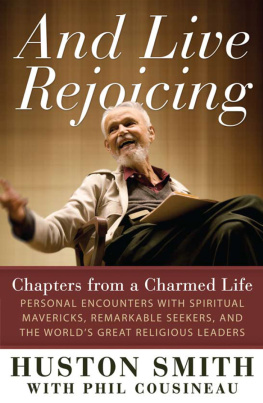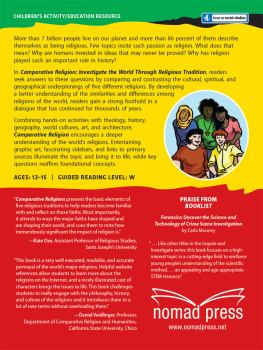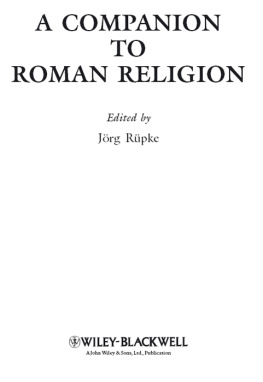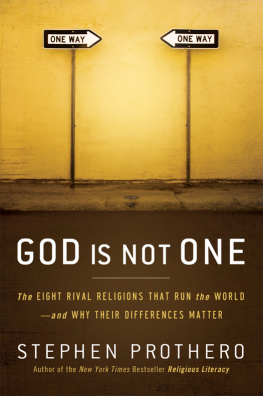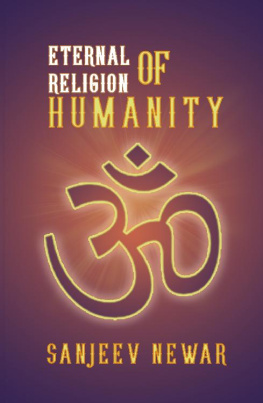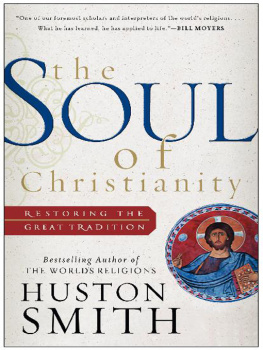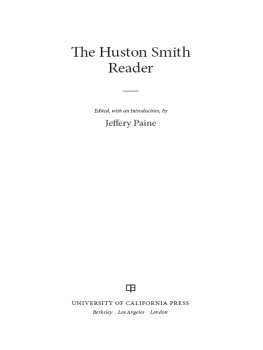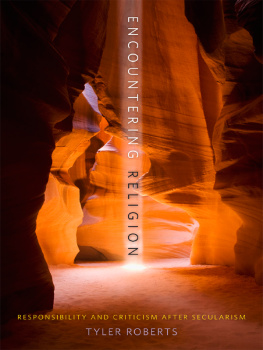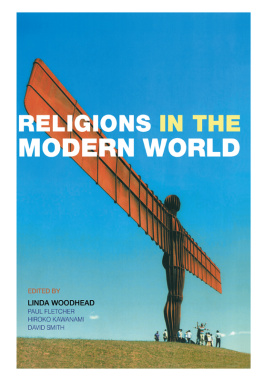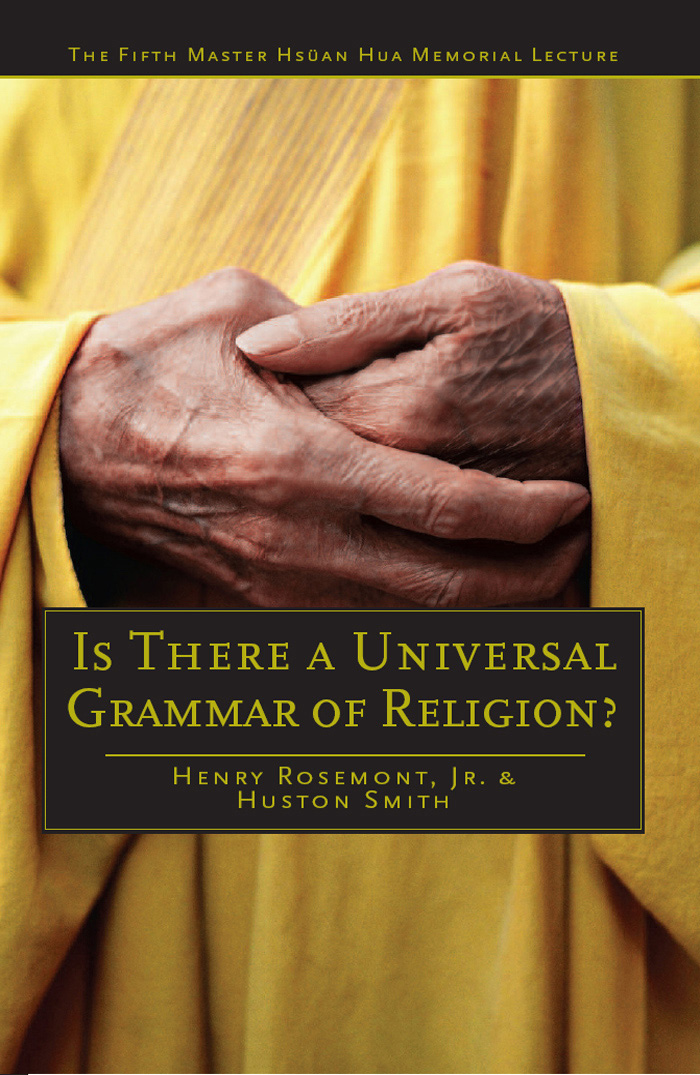
The Master Hsan Hua Memorial Lecture series
General Editor: Martin J. Verhoeven
The First Master Hsan Hua Memorial Lecture
Rationality and Religious Experience: The Continuing Relevance of the Worlds Spiritual Traditions
Henry Rosemont, Jr.
The Second Master Hsan Hua Memorial Lecture
Worldly Wonder: Religions Enter Their Ecological Phase
Mary Evelyn Tucker
The Third Master Hsan Hua Memorial Lecture is not available as a book in this series; published as On State and Religion in China: A Brief Historical Reflection, Religion East and West 3 (June 2003): 120.
The Fourth Master Hsan Hua Memorial Lecture
Our Spiritual Crisis: Recovering Human Wisdom in a Time of Violence
Michael N. Nagler
The Fifth Master Hsan Hua Memorial Lecture
Is There a Universal Grammar of Religion?
Henry Rosemont, Jr., and Huston Smith

To order books from Open Court, call toll-free 1-800-815-2280, or visit our website at www.opencourtbooks.com.
Open Court Publishing Company is a division of Carus Publishing Company.
Copyright 2008 by Carus Publishing Company
First printing 2008
All rights reserved. No part of this publication may be reproduced, stored in a retrieval system, or transmitted, in any form or by any means, electronic, mechanical, photocopying, recording, or otherwise, without the prior written permission of the publisher, Open Court Publishing Company, a division of Carus Publishing Company, 315 Fifth Street, Peru, Illinois 61354.
Library of Congress Cataloging-in-Publication Data
Rosemont, Henry, 1934
Is there a universal grammar of religion? / Henry Rosemont, Jr. and Huston Smith; with the assistance of Martin J. Verhoeven and David Rounds.
p. cm. (The master Hsuan Hua memorial lecture series) (The fifth master Hsuan Hua memorial lecture)
Summary: Huston Smith proposes the idea of a Universal Grammar of Religion and claims fourteen points of substantial identity among all the great religious traditions. Includes Henry Rosemonts response and final reflection, and a conversation between the two Provided by publisher.
Includes bibliographical references and index.
ISBN 978-0-8126-9930-2
1. Religion. I. Smith, Huston. II. Verhoeven, Martin. III. Rounds, David. IV. Title.
BL48.R547 2008
200dc22
2008008663
Table of Contents
- 1. The Lecture
Huston Smith - 2. The Response
Henry Rosemont, Jr. - 3. The Conversation
Henry Rosemont, Jr., and Huston Smith - 4. The Summation
Henry Rosemont, Jr.
Guide
CONTENTS
I n 1958, with the publication of The Religions of Man, later revised as The Worlds Religions, Huston Smith brought before the American public a new way of thinking about religion. He was not the first Christian scholar to have studied the various scriptures of the great religions and among them to have found deep consonances that far outweigh the differences. What Professor Smith added to this was a courageous open-mindedness that allowed him to go beyond merely literary comparisons and to actively participate in the daily observances and the esoteric practices of other religions. Having grown up in China as the son of missionaries, he traveled to Muslim countries and sat at the feet of Sufi masters; he lived in Japan and joined Zen monks in their practice of still meditation; he studied the Vedanta in India. With these and other such experiences, he was able, in his groundbreaking book, to describe the worlds religions with a fresh authority. In simple language that was nevertheless not reductive, he was able to get to the heart of what religions actually mean to the people who practice them. His conclusion was that all religions can serve their adherents in the same ways. Each is based on underlying propositions that reappear in the others. Therefore it is plain, he argued, that all religions have validity and deserve equal respect.
Since the initial publication of The Religions of Man, in the books that have followed it and in countless lectures and interviews, Professor Smith has continued to argue for the indispensable value and the fundamental equality of the worlds religions. Now well into his ninth decade, Professor Smith offers, in the present small volume, a final distillation of his lifetime of study, practice, and insight. He describes a Universal Grammar of religion, in which he claims fourteen points of substantial identity among all the great traditions. Since these points, he argues, are universals, it is evident that a capacity to respond to them must belong to the innate psychophysical makeup of human beings. Borrowing language from the generative linguist Noam Chomsky, who was his friend and colleague at the Massachusetts Institute of Technology, Professor Smith concludes that we are hard-wired with a capacity for religious experience in the same way that Chomsky claims we are hard-wired to speak our native tongues within the constraints of the syntactic patterns that collectively comprise Universal Grammar.
Professor Smiths Universal Grammar of Religion was first presented in March of 2005 as the fifth annual Venerable Hsan Hua Memorial Lecture in Berkeley, California, and was subsequently published in the journal Religion East & West. With his participation and blessing, his Universal Grammar of religion is here re-presented in book form, by means of commentary, elaboration, and counterargument. His partner in this re-presentation is the philosopher Henry Rosemont, Jr., who was an MIT colleague of both Professor Smith and Professor Chomsky, and who himself had delivered a lecture in the Venerable Hsan Hua Memorial series, with Professor Smith as respondent. For the present volume, Professor Rosemont has contributed an introduction, an initial response, a recorded discussion with Professor Smith, and a final reflection. In these he clarifies the Chomskyan theory of universal language structures. He both confirms and questions Professor Smiths application of the theory to religion, especially in the area of ontology. Finally, he identifies areas for further analysis for the next generation of scholar-practitioners of comparative religion.
Martin J. Verhoeven
General Editor, Venerable Hsan Hua Memorial Lecture Series
David Rounds
Editor, Religion East & West
W ithout the scholarly and editorial assistance of Dr. Martin Verhoeven and David Rounds this volume may well have never seen the light of published day. I am deeply grateful to both of them for all their assistance, and for their friendship as well. Ms. Lauren Bausch worked long and hard on the transcriptions of Hustons original lecture, my response, and our later conversation; the basic substance, that is, of . She did a splendid job, which made my editing and revising work much easier, and more accurate, for which I am very grateful. Revamping Hustons old typewritten diagrama handout at his lectureinto a legible visual asset suitable for printing in this volume fell to the capable eyes and hands of Mr. Loc Huynh, Ms. Stacy Chen, and Ms. Kristine Ang Go, and the lexical research and translation of the terms in the diagram was undertaken by Dr. Snjezana Akpinar; for the high quality and clarity of the results I thank them both. Bhikshu Heng Sure took the photographs which grace the book, which aids measurably, I believe, in enhancing the personal quality of the work overall. And I am also grateful to my editor at Open Court, Ms. Cindy Pineo.


